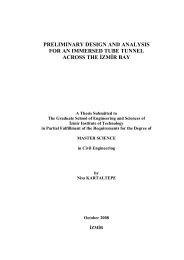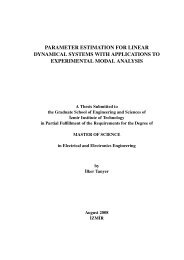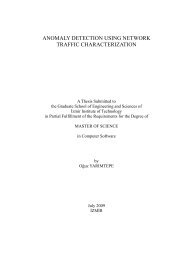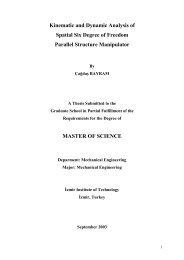a critical evaluation on the concept of justice in planning process
a critical evaluation on the concept of justice in planning process
a critical evaluation on the concept of justice in planning process
Create successful ePaper yourself
Turn your PDF publications into a flip-book with our unique Google optimized e-Paper software.
epresents <strong>the</strong> regulati<strong>on</strong> mechanism <strong>of</strong> distributi<strong>on</strong> and divisi<strong>on</strong> <strong>in</strong> <strong>the</strong> exist<strong>in</strong>g<br />
structure, <strong>in</strong> private sphere, it accompanies ethics as <strong>the</strong> ma<strong>in</strong> po<strong>in</strong>t <strong>of</strong> departure<br />
underly<strong>in</strong>g <strong>the</strong> questi<strong>on</strong> “how can I exist <strong>in</strong> public sphere?”.<br />
In <strong>the</strong>se def<strong>in</strong>iti<strong>on</strong>s, c<strong>on</strong>siderati<strong>on</strong> <strong>of</strong> <strong>the</strong> ways how problems are handled avails<br />
for exam<strong>in</strong>ati<strong>on</strong> <strong>of</strong> plural mean<strong>in</strong>gs <strong>of</strong> <strong>justice</strong> lack<strong>in</strong>g any adequate and c<strong>on</strong>crete<br />
def<strong>in</strong>iti<strong>on</strong> 13 , whe<strong>the</strong>r any decisi<strong>on</strong> or behaviour is “just” or fair or not, and<br />
comprehensi<strong>on</strong> <strong>of</strong> what <strong>the</strong> just c<strong>on</strong>diti<strong>on</strong>s <strong>of</strong> “<strong>justice</strong>” are as expressed <strong>in</strong> this<br />
exam<strong>in</strong>ati<strong>on</strong>. The problems experienced <strong>in</strong> liberal societies c<strong>on</strong>sidered <strong>in</strong> West-centered<br />
assessments and <strong>the</strong> ways <strong>the</strong>se problems are discussed over <strong>in</strong> <strong>the</strong>ories <strong>of</strong> <strong>justice</strong> carry<br />
c<strong>on</strong>siderable importance for <strong>the</strong> <strong>the</strong>oretical framework.<br />
2.2. Differentiati<strong>on</strong>s and Categorizati<strong>on</strong>s <strong>in</strong> Justice Theories<br />
Some <strong>of</strong> <strong>the</strong> current <strong>justice</strong> approaches discussed today are as follows:<br />
1. Robert Nozick and <strong>justice</strong> as liberty <strong>in</strong> <strong>the</strong> neo - liberal approach,<br />
2. John Rawls and <strong>justice</strong> as fairness <strong>in</strong> <strong>the</strong> liberal approach,<br />
3. Alaxdair MacIntyre and <strong>justice</strong> as a moral value <strong>in</strong> <strong>the</strong> communitarian approach,<br />
4. Irıs Mari<strong>on</strong> Young and <strong>justice</strong> as a cultural value <strong>in</strong> <strong>the</strong> Post-structuralist (cultural)<br />
approach,<br />
5. R.G. Peffer and <strong>justice</strong> as a producti<strong>on</strong> relati<strong>on</strong> <strong>in</strong> <strong>the</strong> Marxist approach.<br />
In <strong>the</strong> table below <strong>the</strong> differences and similarities between <strong>the</strong> <strong>the</strong>ories are<br />
generalized. 14 (See Table: 1)<br />
These different <strong>justice</strong> approaches developed <strong>on</strong> <strong>the</strong> basis <strong>of</strong> social structure,<br />
power relati<strong>on</strong>ships and ec<strong>on</strong>omic relati<strong>on</strong>ships vary depend<strong>in</strong>g <strong>on</strong> <strong>the</strong> way <strong>the</strong>y are<br />
dealt with us<strong>in</strong>g <strong>the</strong> follow<strong>in</strong>g criteria;<br />
a: for whom <strong>the</strong>y are <strong>in</strong>tended / how man is def<strong>in</strong>ed and <strong>the</strong> way his class and social<br />
relati<strong>on</strong>ships are handled,<br />
b. which values are c<strong>on</strong>sidered to be <strong>of</strong> top priority,<br />
13 Akta l<strong>in</strong>ks <strong>the</strong> problem <strong>of</strong> not runn<strong>in</strong>g <strong>in</strong>to any agreed def<strong>in</strong>iti<strong>on</strong> although <strong>the</strong> history <strong>of</strong> thought is full<br />
<strong>of</strong> efforts to def<strong>in</strong>e <strong>the</strong> c<strong>on</strong>cept <strong>of</strong> <strong>justice</strong>, to <strong>the</strong> fact that <strong>the</strong>re exists no sphere <strong>of</strong> <strong>justice</strong> to be c<strong>on</strong>cretely<br />
scrut<strong>in</strong>ized (Akta ; 2001;pp.:183-184).<br />
14 For <strong>the</strong>se c<strong>on</strong>ceptual discussi<strong>on</strong>s <strong>the</strong> follow<strong>in</strong>g resources have been referred to: Rawls, (1971) “A<br />
Theory <strong>of</strong> Justice”; Hünler, (1997), “ ki adalet Arasında”,; Nozick (2000) (Anarchy, State and Utopia)<br />
“Anar i, Devlet ve Ütopta”; Peffer, (2001) (Marxism, Morality and Social Justice) Marksizm, Ahlak ve<br />
Sosyal Adalet; MacIntyre (2001) Eti <strong>in</strong> Kısa Tarihi; MacIntyre, (1988), “Whose Justice? Which<br />
Rati<strong>on</strong>ality?”; Young, (1990) “Politics <strong>of</strong> Differences”.<br />
18
















